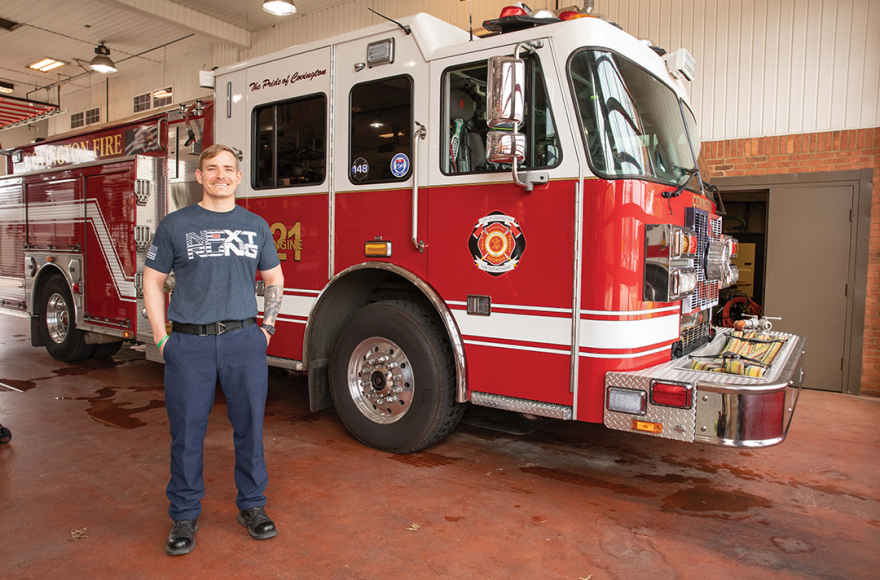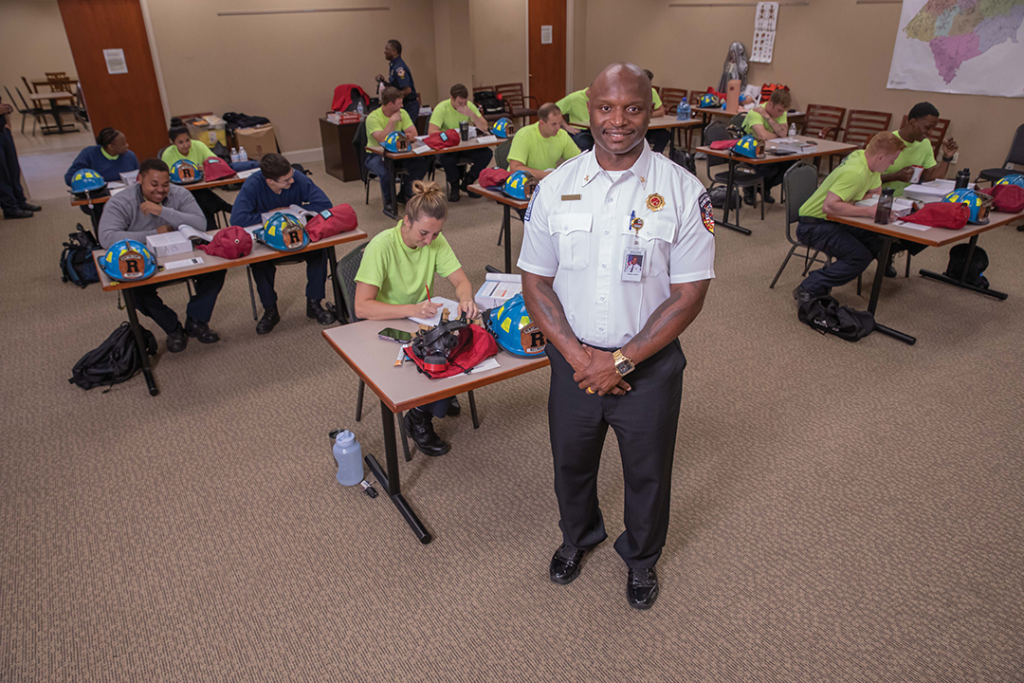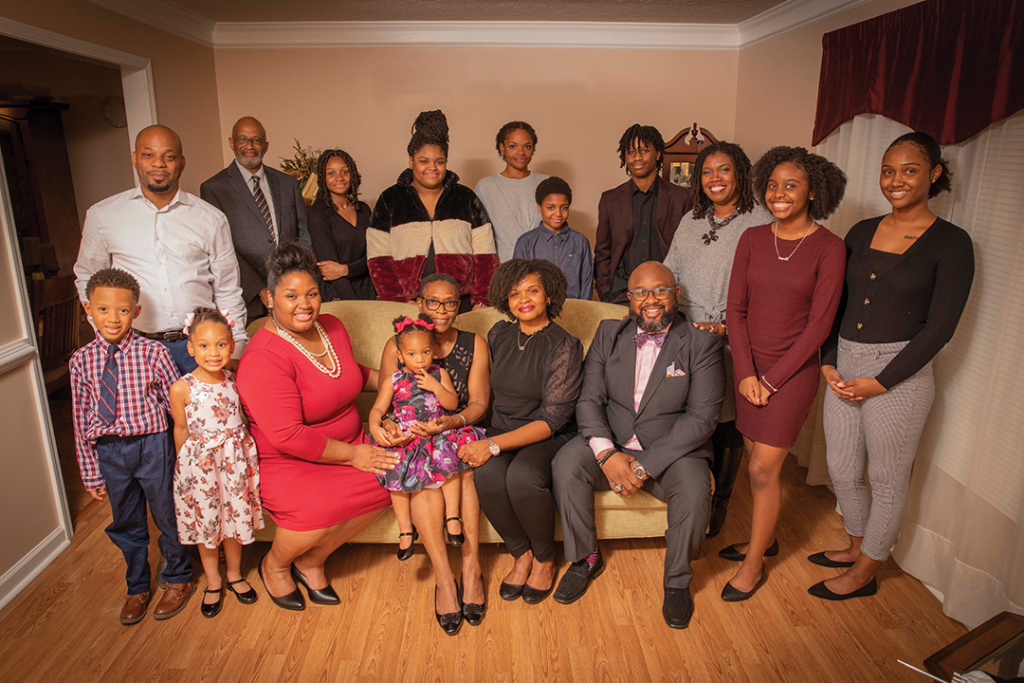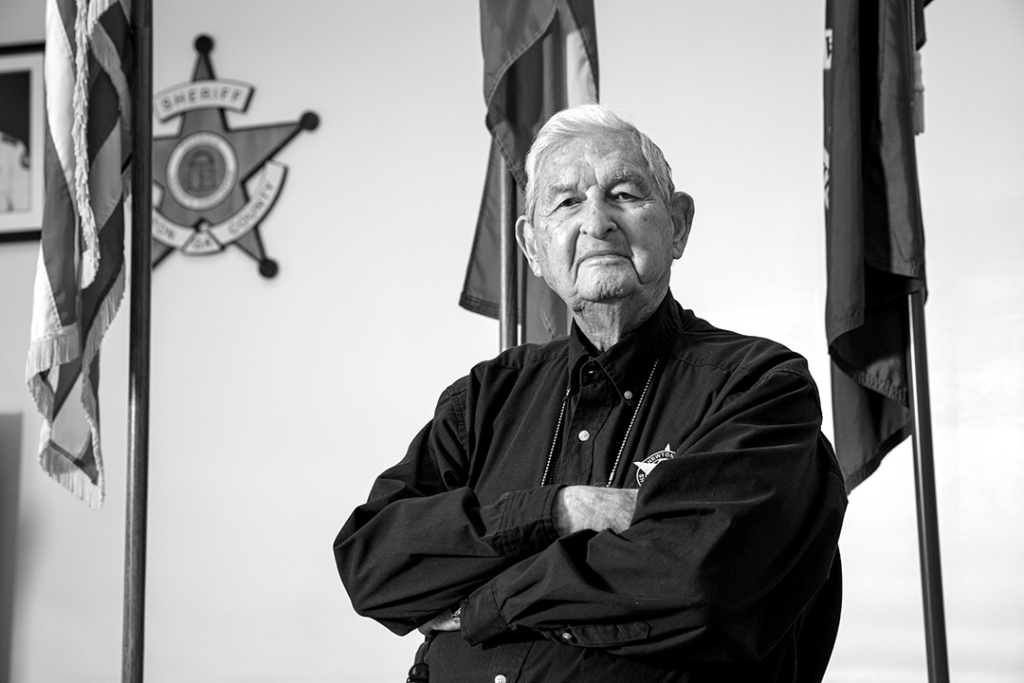The March 2017 suicide of a fellow fireman prompted Newton County’s Blake Stinnett to search for a way to cast out a lifeline to first responders. Soon after, Next Rung was born, offering hope and help to those who might have otherwise succumbed to the relentless stress of their profession.
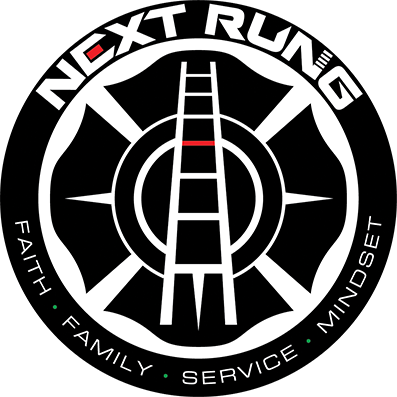
Firefighter Blake Stinnett in March 2017 answered a phone call that shifted his life’s trajectory. Stunned to hear that a fellow fireman he knew had taken his own life, he realized something had to change. Just 28 years old at the time, Stinnett was distraught by how frequently his first-responder friends succumbed to the unrelenting stress of their profession.
“I never really thought about the mental health aspect of the job until that point,” Stinnett said.
Despite being the son of a Newton County volunteer fireman—he also worked for two metro-area fire departments himself—he was alarmed to learn that firefighter suicides sometimes outnumbered line-of-duty deaths. Stinnett’s background gave him many of the keys needed to create a support network. After high school, he earned degrees in psychology and counseling. He also worked in family ministry at First Baptist Church of McDonough for several years before he felt drawn to become a firefighter.
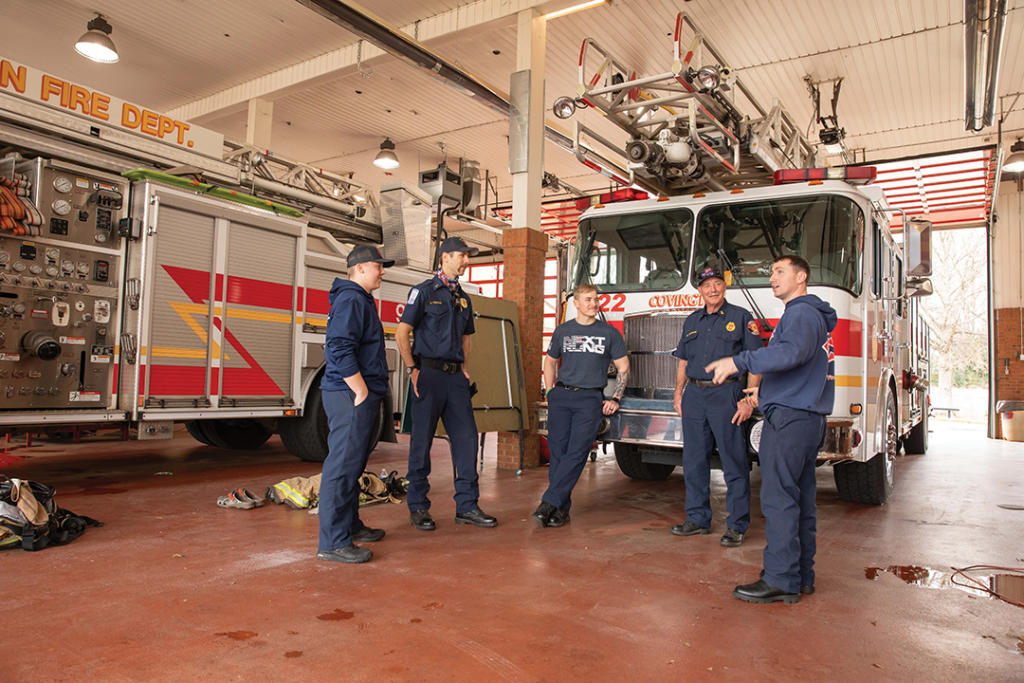
“I always knew I wanted to make an impact in this field,” Stinnett said, “but if I was going to be able to help first responders, I had to become one first.”
Stinnett initially worked with the Gwinnett County Fire Department and now serves with the Sandy Springs Fire Department. After his friend’s suicide, he began selling apparel with the intent of donating the profits to a charity providing mental health support to first responders. However, he had trouble finding an organization that was helping to the extent he envisioned. “Six months into it, I thought, ‘If I can’t find anything, I need to put my money where my mouth is and start something, but I can’t do this on my own,’” Stinnett said. “I brought in my friend Charlie as co-director, and that’s how Next Rung started.” The friend of whom Stinnett speaks, Charlie Brown, works as a firefighter and paramedic in Glendale, California. “As firefighters,” Brown said, “we are called upon in people’s most desperate times of need, but who do we, the firefighters, call when we are in need?”
“There’s that stigma where you don’t want to talk about it because you don’t want to be viewed as weak. We have to change that culture of silence.”
Next Rung Founder Blake Stinnett
The two men share a passion to provide the answer to this question. Their east and west coast locations allowed Next Rung to quickly expand into the nationwide mental health support network it is today. Firefighting is routinely classified as one of America’s most stressful jobs. In fact, a 2019 article published by CBS News rated it second only to a lower-ranking enlisted soldier as the most stressful career choice. Soldiers and first responders share two key characteristics: Stress is nearly always present, and periods of higher stress appear in unpredictable spikes.
While the public is generally aware of the military’s struggles with post-traumatic stress disorder and other mental health crises, few consider the prevalence of these issues in first responders. Fewer still realize how taboo the topic has historically been in the firefighter, EMT and paramedic community.
“There’s that stigma where you don’t want to talk about it because you don’t want to be viewed as weak,” Stinnett said. “We have to change that culture of silence.” He noted another difference between the top two stressful professions. “Soldiers alternate times where they’re deployed and times at home, but firefighters know we’re going to see traumatic situations on every single shift.”
The unique challenges of the profession are why Next Rung relies strongly on peer support from active and retired firefighters. The foundation’s 15 peer support volunteers in 2020 counseled 253 first responders with compassionate, been-there-done-that insight. Stinnett believes this approach has helped more firefighters break through the longstanding tradition of quiet stoicism.
“If we can get people to share their stories, that helps others open up to talk about their experiences,” he said. “The first person we helped was a Hot Shot firefighter out west. Hot Shots are highly trained firefighters who work big wildfires and forest fires, which is mostly seasonal work.”
Stinnett explained that during the offseason, Hot Shot crewmembers have down time to think about all they have experienced.
“He had suicidal ideations,” Stinnett said. “We were able to line him up with a counselor, and he’s done really well. Four years later, he’s married and has a baby. It’s so rewarding to hear that.”
The COVID-19 pandemic has given everyone—including firefighters—more time at home, more time away from work and more time to think. Next Rung has noticed a spike in calls since the pandemic began, especially from firefighters seeking help for substance-abuse problems.
“I read that alcohol sales have ramped up during the pandemic,” Stinnett said. “As firemen, we are kind of known for that anyway; when we get together, there’s drinking involved. It’s really accepted across the board. When people have time to sit and think, their problems hit them in the face. Then they try to drown it all away with alcohol.”
Next Rung in 2020 managed to help six firefighters attend inpatient substance-abuse treatment programs—a revelation Stinnett was proud to share.
“Inpatient treatment costs from $6,000 on the low end up to $30,000 on the high end,” he said. “Insurance companies as a whole don’t adequately cover mental health services. Most fire departments have an employee assistance program that will help you find a counselor, but they cover maybe three sessions and you’re on your own. That’s just enough time to start opening up, then the rug gets yanked out from under you. Even insurance copayments for counseling are high, and without insurance, you’re looking at between $80 and $120 per session.”
Next Rung vows to provide support for as long as it is needed. Some first responders just need to talk to someone once or twice, while others take much longer.
“Cumulative trauma, where things happen over and over, that’s where a lot of people meet their breaking point. Maybe it triggers something from their past that they never dealt with,” Stinnett said. “I tell them that it took a while to get here and sometimes it takes a while to get back. We walk with them for however long it takes to feel comfortable again.”
Next Rung also offers its services to spouses and children of first responders, noting that the profession’s high stress level affects the entire family.
“Sometimes, family members reach out after a loved one has committed suicide,” Stinnett said. “When that happens, we send a donation and a care package to the family and let them know we’re here and [that] they’re not forgotten. Their story provides fuel to our fire to help the person that comes to us next.”
Stinnett runs Next Rung out of his Newton County home, which he shares with his wife Natalie and their children Layleigh and Jack. While he counts it a blessing that the nonprofit foundation has no overhead expenses, financial donations are always needed to continue helping as many first responders as possible. Stinnett and Brown encourage firefighters to reach out and let others help them bear the burden of their experiences.
“Get the help that you deserve,” Stinnett said. “You’ve got to have a support system—everybody needs encouragement and someone to push them at times. You don’t have to face anything alone. I’ll be here until the doors shut or the Lord calls me home.”
For more information on Next Rung, visit NextRung.org.
Click here to read more stories by Kari Apted.

